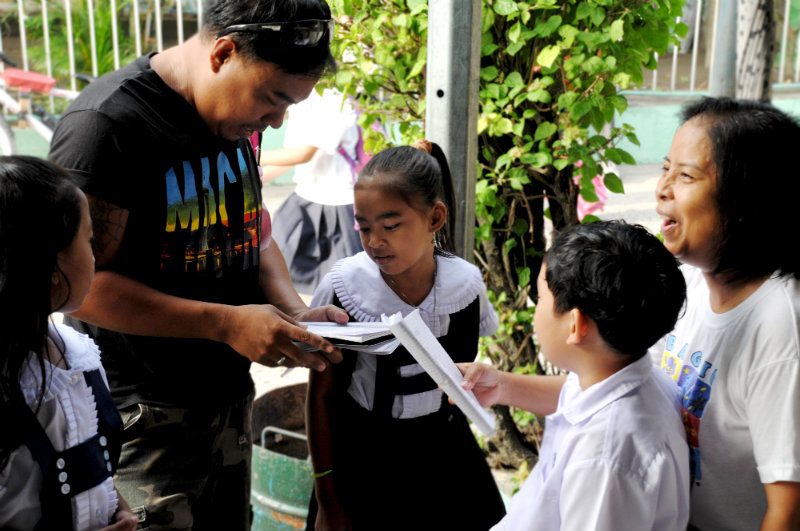SUMMARY
This is AI generated summarization, which may have errors. For context, always refer to the full article.

Andres likes to help out around the house. Even after a long day spent tilling the fields, he’ll do the laundry or pick up the groceries. Admittedly, his wife holds a lot of sway over him, but Andres thinks, “there’s nothing wrong with that.”
His father-in-law, on the other hand, sees things differently.
“That’s not the job of a man,” he says, referring to Andres’ willingness to do housework. “Aren’t you ashamed of yourself?”
Times a-changing
Andres is “Andres de Saya” as portrayed by Vic Vargas in the 1980 film, but the iconic Pinoy character could easily be many househusbands in the Philippines who continue to be mocked simply for doing household chores.
That was made painfully clear to me when I went to visit several stay-at-home dads in Mabalacat City as part of an article I was writing for Maclean’s, a Canadian newsweekly. Each of the househusbands I spoke to had been judged – in one way or another – for their social position.
But times are changing. According to the 2012 Survey on Overseas Filipinos, over a million Filipinas work abroad, up almost 4% from 2011 and that’s on top of the thousands of female breadwinners who live in the Philippines.
With more and more women bringing home the bacon, an increasing number of men are rising to the occasion and working hard to run a smooth household.
Stay-at-home dads
Last year a group of 10 fathers from Mabalacat City were the first to participate in a new two-month program called AMMA (an acronym, that translated, stands for “A father that excels in nurturing his child”) where they learned everything from respecting children to the importance of family bonding. Rather than leave the chores and child rearing to their sisters or mothers like many men with OFW wives, these fathers chose to empower themselves to become competent, nurturing caregivers. Under de sayas they are not.

What they are is part of a growing international group of stay-at-home dads. In the US, there are at least 2 million stay-at-home fathers, double the amount from 15 years ago. Meanwhile, as of 2011, 60,000 men in Canada identify themselves as stay-at-home dads. That means that one in 8 stay-at-home parents are fathers. These men take pride in being capable parents and they’re making sure the world knows it.
Recently, several North American daddy bloggers took on the likes of Huggies and Playskool after the men felt that the brands insulted their parenting skills. The dads won. The powerhouses apologized.
Now, Filipino fathers are taking baby steps towards a similar path of empowerment. Aside from AMMA, some dads are signing up for a program called the Empowerment and Reaffirmation of Paternal Abilities (ERPAT). It’s run by the Department of Social Welfare and Development and is designed to enhance men’s parenting skills. There’s also the Little Bamboo Foundation, a charity based in Cebu, which offers workshops that aim to strengthen the bond between father and child.
Atikha, a nongovernment organization, also educates fathers left behind by their OFW wives in financial literacy and savings.
These programs benefit not only the fathers, but the mothers as well. Honey Carandang, a clinical psychologist who spearheaded AMMA, said that creating competent fathers helps working mothers, particularly those abroad, by giving the women peace of mind in knowing that their children are being well taken care of.
More than a piggy bank
Househusbands deserve our respect. At the end of the day, we need to remind our fathers, husbands, and sons that they’re capable of being more than just a piggy bank. With the right mixture of guidance and support, househusbands can be strong, nurturing parents in their own right.
Soon after the first AMMA workshop ended, the graduates were eager to go out and teach other househusbands what they learned. They developed a sense of self-worth. They insisted on getting t-shirts as a way to promote their unified identity. They could be overheard saying, “the father is no longer the haligi (pilar), he’s also the ilaw (light).”
These househusbands didn’t sound ashamed to me. And they shouldn’t be. Even Andres’ father-in-law would be forced to agree. – Rappler.com
Read about the inspiring journey of one stay-at-home father who partook in the AMMA program at http://www.macleans.ca/politics/worldpolitics/fatherhood-101/
Fatima Arkin is a Filipina-Canadian journalist based in Manila. She’s interested in issues affecting the Philippines and Canada. When not writing, she can be found hopelessly trying to perfect her pancit palabok. You can follow her at @FatimaA8
iSpeak is Rappler’s platform for sharing ideas, sparking discussions, and taking action! Share your iSpeak articles with us: move.ph@rappler.com.
Tell us what you think about this iSpeak article in the comments section below.
Add a comment
How does this make you feel?
There are no comments yet. Add your comment to start the conversation.